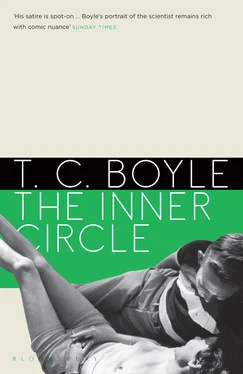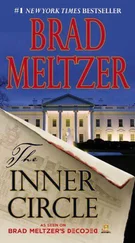I went home then, to see if I’d somehow missed her, and I sat there brooding till seven. When the bell in the church tower two blocks over struck the hour I pushed myself up and walked the ten blocks to the office, and this time I used my key in the door. I hit the light switch and the shadows fled into the corners. It was very still. I stood there a moment in the doorway, and then I couldn’t help but go to my desk and examine it — I bent down and sniffed it, actually sniffed the surface of my own desk as if I could somehow detect the residue of vaginal lubricants there, as if I were a bloodhound, as if I were some petty and heartbroken cuckolded fool stooping so low as to drop off the chart of humiliation, even — and I examined Corcoran’s desk too, shuffling through his things, probing into his drawers, looking for something, anything, that would give me a clue as to who he really was and what he might want. And how did I feel then, standing there in the lamp-lit office rifling my colleague’s desk while the sky closed down over the campus and couples were strolling out hand-in-hand to the dance, the pictures, dinner? Devastated. Devastated, certainly, but it was worse than that: I felt as if I’d somehow failed Iris, as if I were the one at fault. More than anything, and I hate even to remember it, I felt inadequate.
Our research would show that some twenty-six percent of women and fifty percent of men would engage in extramarital intercourse — I myself drew up the accumulative incidence curve on page 417 of the female volume — and we would conclude, in Prok’s words, that “Extramarital coitus had attracted some of the participants because of the variety of experience it afforded them with new and sometimes superior sexual partners.” Exactly. And yet the female volume was still a decade in the future — we’d only begun to accumulate the data at this point — and so my attitude was purely intuitive. I’d been with Mac. I could still smell her on my fingertips. But that didn’t matter a whit, not now — all that mattered now was Iris, Iris and Corcoran.
I went back home — eight o’clock and no sign of her — and I poured a drink and brooded some more. When eight-thirty came and she still hadn’t appeared or even called, I copied out a poem, or a fragment of a poem, from her anthology, and left it on her pillow in the bedroom, then took the long walk to Corcoran’s to see if his car was parked out front, if his windows were lit, if there was movement there, a silhouette on the shade, anything. The night had grown cold and I watched it stream from my mouth as I walked, my shoulders tense, all my emotions — rage, despair, scorn, vengefulness — wadded up like a bolus in the pit of my stomach. There was no yellow convertible drawn up to the curb outside Corcoran’s apartment, and there was no sign of life inside. I stood there for two hours and more, then I turned away and went home, defeated.
Need I say that Iris wasn’t there? The poem was where I’d left it, though, untouched, and it might have remained there all night and into the next day, for all I knew. I had no idea when she came home that night or if she came home at all because I bundled up some things in a suitcase — a change of clothes, toiletry articles, bedding — and dragged myself back to the office to sleep on the floor while the abandoned building, one of the oldest on campus, ticked and settled round me in a state of decline that couldn’t help recalling my own. I wasn’t yet twenty-four and already my life was over. I should have enlisted, I told myself. Should have gone to fight and kill and be killed, because anything was better than this.
The poem, incidentally, was from Hardy, bile-bitter and as grim as it gets. I suppose now it looks a bit sophomoric — the sentiments expressed, the whole gesture — but then it seemed to strike right to the heart of what I was feeling. It’s called “Neutral Tones,” and the speaker is looking back on the bleak day by a frozen pond when the smile on his lover’s lips went dead. I left her with the last four lines:
Since then, keen lessons that love deceives,
And wrings with wrong, have shaped to me
Your face, and the God-curst sun, and a tree,
And a pond edged with grayish leaves.
I slept in the office for two nights, never venturing within ten blocks of the apartment, because if she could make me suffer I could make her suffer too. Let her stew, that was what I thought, let her stew until she’s as sick at stomach as I am. But where was Corcoran? I waited for him that first morning with a dry throat and a pounding in my temples that was calibrated to a recurrent hormonal rush, and then eight o’clock slipped by, and eight-ten, and I put it to Prok as casually as I could, Where is he? Prok barely glanced up. It had slipped his mind, but he’d neglected to tell me that he’d given our colleague two days off to see to a personal matter, and that was where it ended — Prok barely lifted his head from his work all the rest of the day. There was no chatter, no humor, and the only relief from routine came when we interviewed two young women for the position of full-time secretary, and subsequently, one-on-one, took their histories.
At the end of the second day, having heard nothing from Iris, I went back to the apartment, but warily, looking for signs, coming up the walk and approaching the front steps with the slow deliberation of a sapper, as if the place had been mined and booby-trapped by the retreating forces. The first thing I noticed was the milk — there they were, two bottles, nestled side by side in the insulated box on the porch, undisturbed. There was no sound of the radio, no lights left burning. Everything sank in me. I turned my key in the lock and came in to a smell of nothing, of a tomb, of a place that was empty and had been empty and might never be inhabited again. It was as if the people who’d lived here had disappeared, that nice young couple, as if they’d been kidnapped and held for ransom and no one could tell if the sum would ever be raised.
Her clothes were there still, hanging in the wardrobe, her brushes and toilet things, her shampoo — it was all there. It probably took me fifteen minutes, a good quarter hour of poking through things in a kind of mind-numbing despair, until I noticed that the poem was gone, replaced by a few lines in her own hand, and I still don’t know where she got them from:
I never again shall tell you what I think.
I shall be sweet and crafty, soft and sly.…
And some day when you knock and push the door,
Some sane day, not too bright and not too stormy,
I shall be gone, and you may whistle for me.
I couldn’t breathe. I had to pour a drink and ease myself down in the armchair, so weak suddenly my legs wouldn’t support me. Gone? I shall be gone? And what was that supposed to mean? I couldn’t fathom it — was she saying she would leave me, that she didn’t want me anymore, that Corcoran had taken my place and negated everything between us in the course of what, a week? Sane? No, it was insane. I loved her, she loved me. How could anything ever change that?
If I thought that was the low point, exchanging bitter poems, warfare by proxy, the drink and the chair and the empty apartment, I was wrong. Because even as I sat there in the armchair, the glass in one hand and the sheet of paper she’d inscribed in the other (and I’d sniffed that too, holding it to my nose and breathing deep in the hope of catching the remotest fleeting scent of her), there was the sound of her heels on the steps and her key turning in the lock, and in the next instant I had to look her in the face and listen to her tell me that she was in love.
There she was, flush with it, her hair disheveled and her clothes looking as if they’d been slept in (and they had, or no, they hadn’t, and I didn’t want to think about that either). She came straight into the room, threw down her purse and her coat, and told me she was sorry, but that was how it was, she was in love.
Читать дальше












